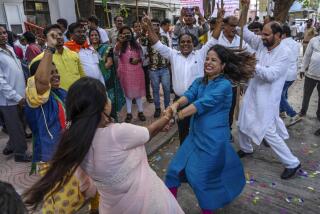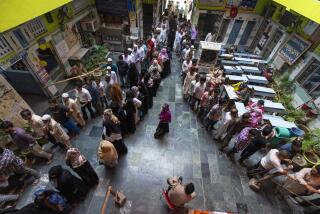Poor Dislike Gandhi; Some Have No Vote : India: The balloting begins. Widespread dissatisfaction with the prime minister could end the family dynasty.
- Share via
FARIDABAD, India — As key national elections in India opened Wednesday, Ram Sharan stood in the rock quarry where he has worked as a virtual slave for a decade and explained why he and many of his fellow villagers were not among the half-billion voters heading to the polls in the country that bills itself as “the largest democracy on earth.”
“We have no vote,” said Sharan, 34, adding that he even spent 20 rupees--about $1.50, the equivalent of two days’ wages--trying to register this year. “We filled out the forms, but the forms were sent into the dust bin. This is how democracy works for us here.”
Ram Sharan is a bonded laborer, one of an estimated 15 million Indians who toil in quarries, carpet factories and sweatshops--not for wages, but to pay off ancestral debts and other obligations.
They are part of a system that is little more than indentured slavery, which, although banned by law, still flourishes in rural India. Most are “untouchables,” the lowest of low-caste Hindus.
In election years past, these impoverished minorities formed the bedrock of support for the ruling party of Prime Minister Rajiv Gandhi. But on election day 1989, the mere mention of Gandhi’s name brought derision and anger in Sharan’s village of dried-manure walls and tattered thatch roofs, just two miles beyond the city limits.
“If we had the vote,” Sharan concluded, “we would turn this party out.”
Elsewhere in India, though, hundreds of millions of voters did go to the polls Wednesday, the first of three voting days that will determine the future of the family dynasty that has governed India for most of the period since it attained independence in 1947. Gandhi’s mother, Indira, governed for 16 years, and her father, Jawaharlal Nehru, for 17 years.
In isolated incidents of violence that are common in Indian elections, more than 40 people were reported killed, and several candidates, among them Gandhi’s opponent in his home district, alleged vote fraud. But polling was largely peaceful nationwide as about 7,000 candidates from eight major parties vied for 525 seats in the Indian Parliament, which will select the next prime minister.
Election officials described Wednesday’s turnout as average--55% to 60%. But so vast is the Indian nation and its electorate that the voting is spread over five days, and election officials said no official results will be announced before Sunday, the final voting day.
Recent independent polls indicate that the sentiments expressed by Ram Sharan and his fellow bonded laborers are shared by many Indian voters this year. Nationwide support for the 45-year-old prime minister and his Congress-I Party is at its lowest ebb since 1977, when the party, led by Indira Gandhi, was routed by a similar coalition that collapsed three years later.
Similarly, the polls have shown growing support for the National Front opposition bloc spearheaded by Gandhi’s former defense minister, Vishwanath Pratap Singh, who resigned from Gandhi’s Cabinet in 1987 after discovering that tens of millions of dollars in kickbacks had been paid on an Indian arms deal with the Swedish firm Bofors.
Gandhi says the corruption issue is unimportant in rural areas.
In Ram Sharan’s village, the corruption issue clearly has hit home. It was Sharan who raised the village’s consciousness; he is the only one who can read.
“I went through the eighth grade in my home village,” about 500 miles south of the nation’s capital, he said. “But I had no land and no work, so I was brought here.”
Sharan borrowed money from the quarry master to get settled. That was 10 years ago. But the interest on the loan was enormous and compounded daily. Sharan is still working just to pay it off.
But he is better off than the others, many of whom have worked in the quarries since childhood to pay off similar debts incurred by parents and grandparents. For them, Ram Sharan is a link to the outside world.
Encouraged by a human rights group called the Bonded Laborers Liberation Front, organized by prominent Hindu activist Swami Agnivesh, the quarry workers tried to register. But according to the front’s general secretary, Kailash Satyarthi, they found that the system works against them.
Because the bonded laborers are largely migrants who own no land, the law requires them to return to the village of their birth for a certificate, a trek that none can afford. And without the certificate, they cannot register.
“It is a vicious circle,” said Ishwar, another bonded laborer whose missing right eye and deformed hand are testimony to his four decades in the quarries, which claim an average of 60 lives a year from blasting mishaps, falling rocks and truck accidents.
Ishwar was among just five laborers in the village who could vote. But it was only because he was born in the quarries--and into debt--40 years ago that he could secure a certificate. Wednesday, he made sure he used it.
He awoke at 4 a.m., walked two miles to the nearest polling place and voted for the opposition.
More to Read
Sign up for Essential California
The most important California stories and recommendations in your inbox every morning.
You may occasionally receive promotional content from the Los Angeles Times.













